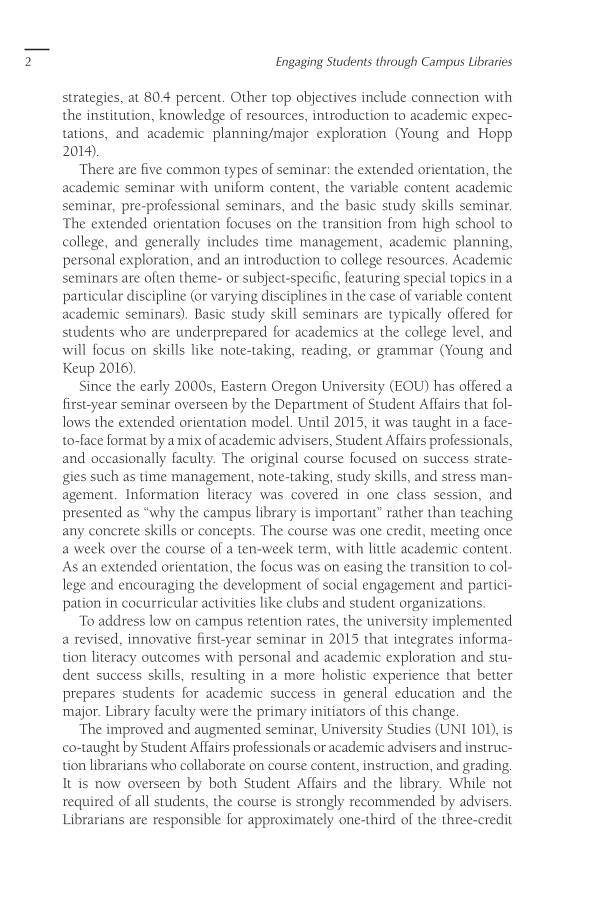2 Engaging Students through Campus Libraries strategies, at 80.4 percent. Other top objectives include connection with the institution, knowledge of resources, introduction to academic expec- tations, and academic planning/major exploration (Young and Hopp 2014). There are five common types of seminar: the extended orientation, the academic seminar with uniform content, the variable content academic seminar, pre-professional seminars, and the basic study skills seminar. The extended orientation focuses on the transition from high school to college, and generally includes time management, academic planning, personal exploration, and an introduction to college resources. Academic seminars are often theme- or subject-specific, featuring special topics in a particular discipline (or varying disciplines in the case of variable content academic seminars). Basic study skill seminars are typically offered for students who are underprepared for academics at the college level, and will focus on skills like note-taking, reading, or grammar (Young and Keup 2016). Since the early 2000s, Eastern Oregon University (EOU) has offered a first-year seminar overseen by the Department of Student Affairs that fol- lows the extended orientation model. Until 2015, it was taught in a face- to-face format by a mix of academic advisers, Student Affairs professionals, and occasionally faculty. The original course focused on success strate- gies such as time management, note-taking, study skills, and stress man- agement. Information literacy was covered in one class session, and presented as “why the campus library is important” rather than teaching any concrete skills or concepts. The course was one credit, meeting once a week over the course of a ten-week term, with little academic content. As an extended orientation, the focus was on easing the transition to col- lege and encouraging the development of social engagement and partici- pation in cocurricular activities like clubs and student organizations. To address low on campus retention rates, the university implemented a revised, innovative first-year seminar in 2015 that integrates informa- tion literacy outcomes with personal and academic exploration and stu- dent success skills, resulting in a more holistic experience that better prepares students for academic success in general education and the major. Library faculty were the primary initiators of this change. The improved and augmented seminar, University Studies (UNI 101), is co-taught by Student Affairs professionals or academic advisers and instruc- tion librarians who collaborate on course content, instruction, and grading. It is now overseen by both Student Affairs and the library. While not required of all students, the course is strongly recommended by advisers. Librarians are responsible for approximately one-third of the three-credit
Document Details My Account Print multiple pages
Print
You have printed 0 times in the last 24 hours.
Your print count will reset on at .
You may print 0 more time(s) before then.
You may print a maximum of 0 pages at a time.





























































































































































































